Daniil Kholmsky - the invincible governor of Ivan III
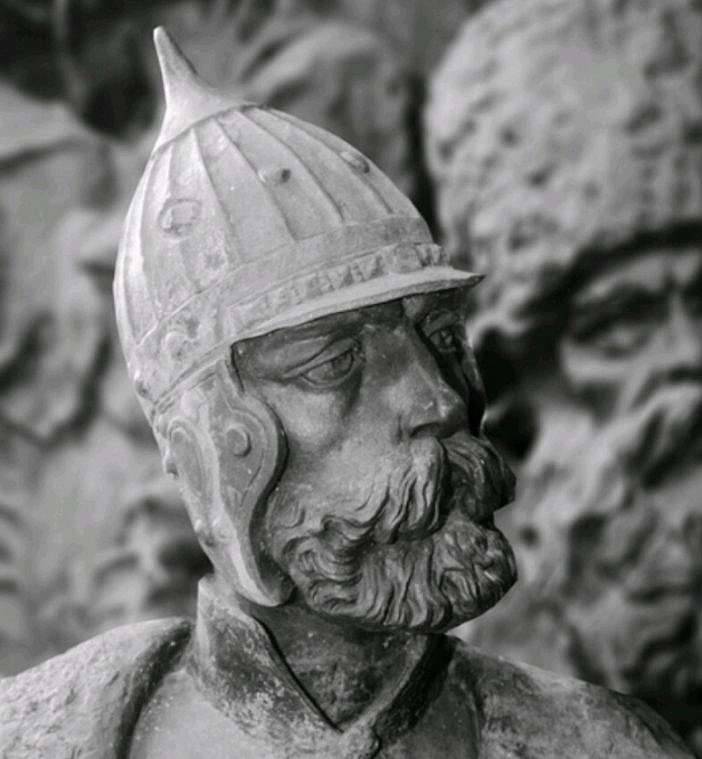
The beginning of military career
Daniil was one of the younger sons of the specific Tver prince Dmitry Kholmsky. After the death of Dmitry, the elder brother of Daniel, Mikhail, becomes the prince of the Kholmsky inheritance. Soon a conflict arose between the brothers, as a result of which Daniel did not receive from his brother his inheritance in the principality, which was traditionally supposed to be the younger brothers of the prince.
Daniel will repay his brother in the same coin in the future. In 1485, the famous Tver campaign of Ivan III will take place, the last prince of Tver will be forced to flee to Lithuania, and the principality of Tver itself will be given by Ivan to his eldest son Ivan the Young. Daniel with other Moscow governors will take part in this campaign and, together with the Moscow regiments, will return to their native land. The Kholmsky specific principality, along with other inheritances of the Tver princely house, will be liquidated.
Already in 1486, Mikhail Kholmsky would be arrested on charges of treason to the sovereign, deprived of his property and sent to prison in Vologda. Daniil, having by that time acquired significant influence at the sovereign's court, would not intercede for his brother, despite the fact that one of his appeals to Ivan III could save Mikhail ...
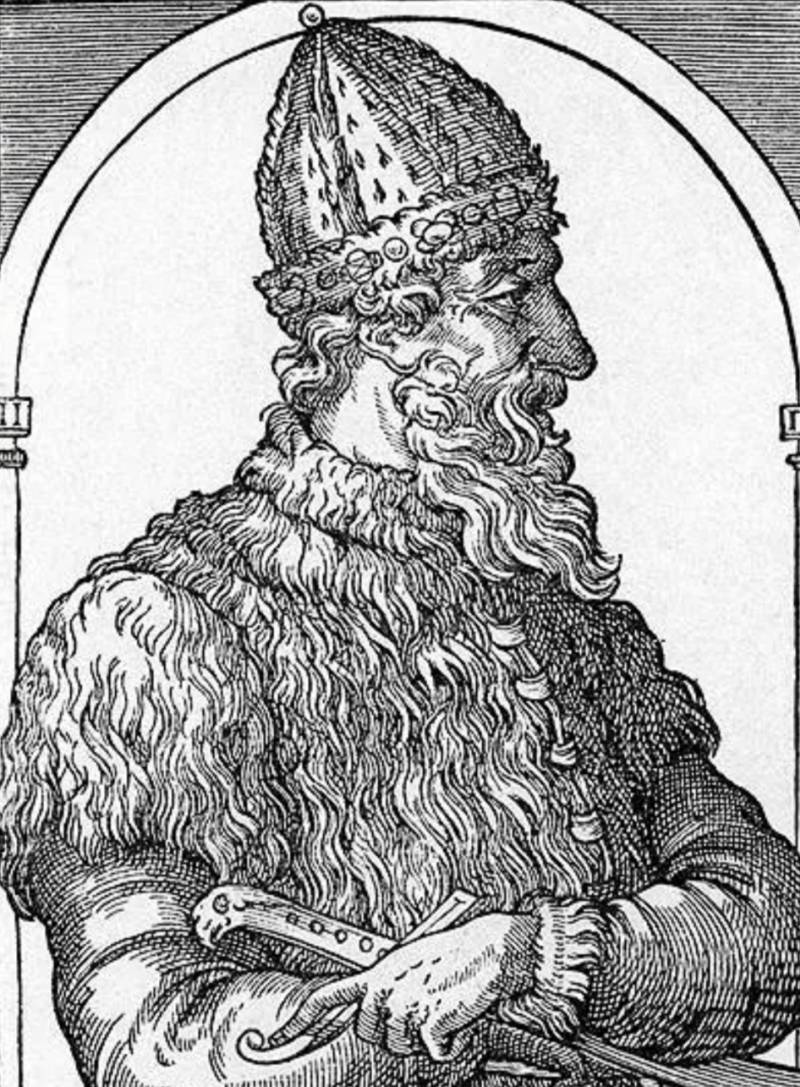
During the reign of Ivan III (1462-1505), most of the Russian lands were united under the rule of Moscow, as well as the overthrow of the hated Horde "yoke". Engraving by the French artist Andre Theve, 1585
One way or another, in the 1460s, Daniel left his native lands and entered the service of the Grand Duke of Moscow Ivan III. In those days, it was restless on all borders, but the situation in the eastern directions was the most tense.
Since the 1440s, one of the most aggressive fragments of the Golden Horde, the Kazan Khanate, has formed near the eastern borders of the Russian lands. Kazan Tatars raided the border lands: they robbed and took away the local population, with the aim of subsequent sale into slavery. The governors of the border fortresses had not only to repel enemy raids, but also to make retaliatory campaigns deep into the Kazan lands, thereby preventing future raids and freeing the population driven into slavery.
It is on the eastern borders of the Moscow principality that Daniil Dmitrievich's talent first manifests itself. In 1468, being a governor in Murom, he repulsed the Tatar raid and, pursuing the enemy, put the Tatars to flight, recapturing the entire “full” from them.
In 1469, in a return campaign against Kazan, the prince led the advanced regiment of the “horse army” - the vanguard of the Russian army (* The participation of the prince in the campaign of 1469 is questioned by some historians). His regiment was one of the first to approach Kazan and besiege the city. The blockade of the city for the Russian troops developed successfully - the outing of the Tatars was repulsed, the access of drinking water to the city was blocked. The threat of thirst prompted the garrison and Khan Ibrahim to capitulate. A peace was concluded between the parties, according to which the Kazan Khanate was obliged to stop the raids and return all Russian prisoners.
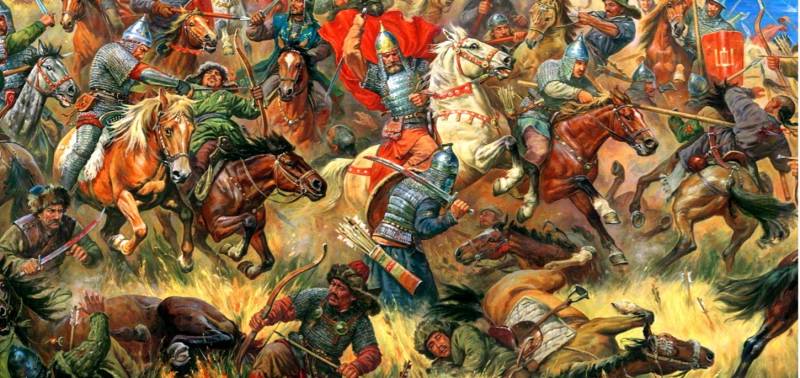
The battle of the Moscow regiments with the Kazan Tatars. First half of the XNUMXth century. Modern art reconstruction
Star hour of the commander
Immediately after the conclusion of peace with Kazan, Ivan III begins to prepare for war with the freedom-loving Novgorod land, where the pro-Lithuanian group of boyars, led by Martha Boretskaya and her sons, came to power. The stakes in this war were higher than ever.
Control over the rich Novgorod land was vital for the young Muscovite state. Only by using the huge material and human reserves of Novgorod, Rus' could gather enough strength to overthrow the hated Horde domination. Defeat in the war promised the establishment in the Novgorod lands of the power of Moscow's longtime adversary - the Grand Duchy of Lithuania, which, along with the Kazan Khanate in the east, would create a solid wall of hostile states around Moscow.
Kholmsky's victories could not fail to attract the attention of the sovereign. In the Novgorod campaign of 1471, the prince was entrusted with the leadership of the vanguard of a part of the Russian army advancing on Novgorod through Staraya Russa, in order to prevent the Novgorodians from connecting with their allies - a detachment of Livonian knights. The appointment is not so honorable as responsible.
Daniil Dmitrievich will not let his sovereign down: already on June 23, his detachment almost without a fight occupied and burned Staraya Russa. From Russa, Kholmsky's army advanced further to the Shelon River. Near the village of Korostyn on the shore of Lake Ilmen, a battle took place with the Novgorod ship's army, which, having landed troops, tried to unexpectedly attack the Moscow regiments.
Kholmsky forestalled their attack with a powerful flank counterattack. The Novgorod army was defeated, many soldiers were captured. On the banks of the Pole River, Kholmsky had to engage in battle with another Novgorod army, which outnumbered the first. The numerical superiority did not help the Novgorodians - unable to withstand the swift attack of Kholmsky, the Novgorod regiments fled.
Returning to Russa, the prince receives an order from Ivan III to move beyond Shelon to join the allied army of Pskov. The thinned army of Kholmsky and a detachment of Tatars of the service prince Daniyar immediately set out on the road. On July 14, near the Shelon River, Kholmsky unexpectedly stumbled upon the main forces of the Novgorod land - the “forged boyar army”. Chronicles estimate the number of Novgorodians at 40 people, while Kholmsky had no more than 000 people.
Realizing that only a swift attack could bring him victory, the prince showed amazing determination and immediately began to act, without conducting preliminary reconnaissance in battle. According to the chronicle, the riders crossed the Shelon with a "lion's roar", intimidating the enemy, and then showered him with a cloud of arrows. This was a tactic previously successfully tested in battles with the Tatars. The Novgorodians did not think that the small Moscow regiments would decide to attack, and did not expect an imminent attack.
The crossing of Sheloni by Kholmsky came as a complete surprise to them. When arrows flew at them, part of the Novgorod army faltered, provoking a mass exodus. The swift attack of the Moscow cavalry overturned the remaining regiments, mass extermination and capture of the fleeing Novgorodians began. As the Moscow Chronicle reports:
In many ways, such an easy victory went to Kholmsky due to the inconsistency of the Novgorodians. Between the Novgorod boyars and ordinary citizens, forcibly recruited into the militia, there were serious disagreements, in fact there was no single command. The archbishop's regiment, on the instructions of the Novgorod lord, did not take part in the battle at all, referring to the fact that it was sent for war only with the Pskovites.
The lack of combat experience and good weapons among most of the Novgorod army, represented by simple artisans and peasants, also played a role. Nevertheless, the outcome of the battle could have been anything if not for the initiative and energy of Daniil Kholmsky. The losses of the Novgorodians amounted to more than 12 killed, the most prominent Novgorod boyars and 000 ordinary soldiers were captured.
Kholmsky's victory predetermined the outcome of the entire war and made the end of the independence of the Novgorod land inevitable. Already on August 11, the Korostyn peace was concluded, according to which Novgorod was forced to fulfill all the requirements of Moscow (severing all ties with Lithuania, paying a huge indemnity, transferring part of the territories), the Novgorod boyars swore allegiance to Moscow.
Daniil Dmitrievich also made a significant contribution to the final annexation of the Novgorod land. In the last Moscow-Novgorod war of 1477-1478. he led the advance detachment, which actually performed the functions of modern special forces. His detachment occupied and kept under control until the approach of the main forces of Ivan III Gorodishe and a number of suburban monasteries.
It is difficult to overestimate the significance of Kholmsky's "landing": the Novgorodians were unable to create a second ring of city defenses from the stone strongholds of the monasteries, and the approaching Moscow regiments managed to encircle Novgorod and fire at the city fortifications from their territory.
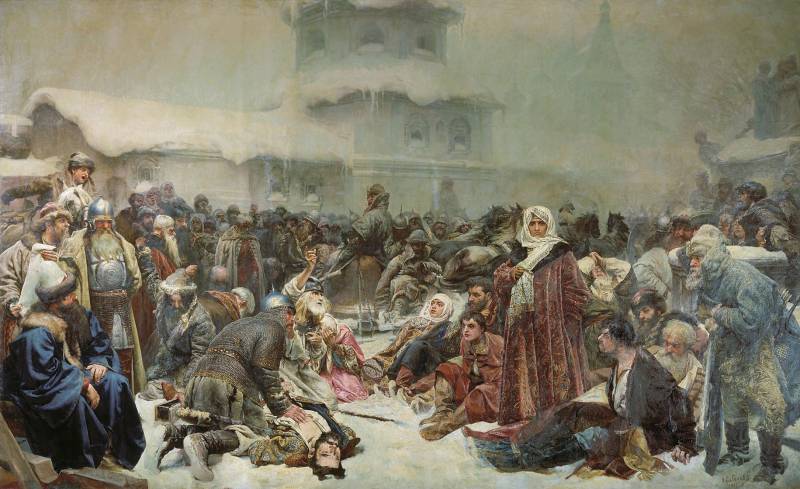
The defeat of the Novgorod regiments on the Shelon River predetermined the fall of the Novgorod land. In 1478, Novgorod will be finally annexed to the young Muscovite state. K. V. Lebedev “Marfa Posadnitsa. Destruction of the Novgorod vech"
The overthrow of the Horde "yoke"
In order to end the Pskov-Livonian conflict, in 1473 Kholmsky went to Pskov as the viceroy of the Grand Duke, bringing with him a large military force. Frightened by the arrival of the Moscow rati, the Livonians concluded the so-called Danilyev Peace (after the name of the governor) for 30 years "with all the will of Pskov."
As a reward for this success, Ivan III granted Kholmsky to the boyars (according to other sources, he received the boyars in 1479).
In 1840, Nestor Kukolnik created the tragedy "Prince Daniil Kholmsky", dedicated to the Pskov period of the commander's life, the music for it will be written by the famous composer Mikhail Glinka.
But already in 1474, the prince fell into disgrace - the winner Sheloni, accused of planning to flee abroad, would be arrested. Probably, the reason for the disgrace was the slander of one of the representatives of the old Moscow boyars, who was dissatisfied with the rapid rise of the "artful upstart". But by that time, Kholmsky had managed to acquire connections in the "highest echelon of power", which is why I. N. Vorontsov and seven other Moscow boyars vouched for the prince, pledging to pay an astronomical sum of 2 rubles in the event of the prince's escape. Soon Prince Kholmsky will be released.
In 1476, Ivan III stopped paying tribute to the Khan of the Great Horde, and in August 1480, he tore up the letter of Khan Akhmat and executed his ambassadors who had come for tribute. War becomes inevitable.
In the autumn of 1480, Russian and Horde troops met on the Ugra River. In October - early November 1480, decisive events unfolded on the Ugra. Kholmsky, together with other governors, goes to the Ugra to organize a rebuff to the steppes. The heir to the throne, Ivan Ivanovich Molodoy, was considered the formal commander of the Russian army, but behind him stood voivode Daniil Dmitrievich Kholmsky, the most successful of Ivan III's voivodes. Governor, whom the prince completely trusted by that time.
In October, the cautious Ivan III, mistakenly considering the situation too dangerous, ordered his son to immediately leave the army and return to Moscow. If the prince refused, Kholmsky had to deliver him to Moscow by force. Ivan Ivanovich, realizing that his departure could adversely affect the morale of the troops, refused to obey:
- said the prince.
Kholmsky faced a difficult choice: failure to comply with the order of the Grand Duke threatened with a new disgrace, but he was well aware of the negative consequences for the Russian army that the prince’s departure could cause ... Fortunately for him, the Tatars made an attempt to cross the Ugra, and in the course of fierce enemy skirmishes managed to be discarded, after which the question of sending Ivan the Young to Moscow was decided by itself.
In addition to controlling the heir to the throne, Kholmsky also performed his immediate voivodship duties. It was he who was responsible for fording and "climbing" across the river, and also determined the time and direction for counterattacks. He had to engage in a broad defensive operation, distributing a limited number of forces to possible areas of the Tatar breakthrough, and when frosts fettered the Ugra, Khan Akhmat did not dare to open battle with such an experienced enemy, moreover, armed with squeakers and artillery. So Daniil Dmitrievich entered his name in history liberation of Rus' from the Horde "yoke".
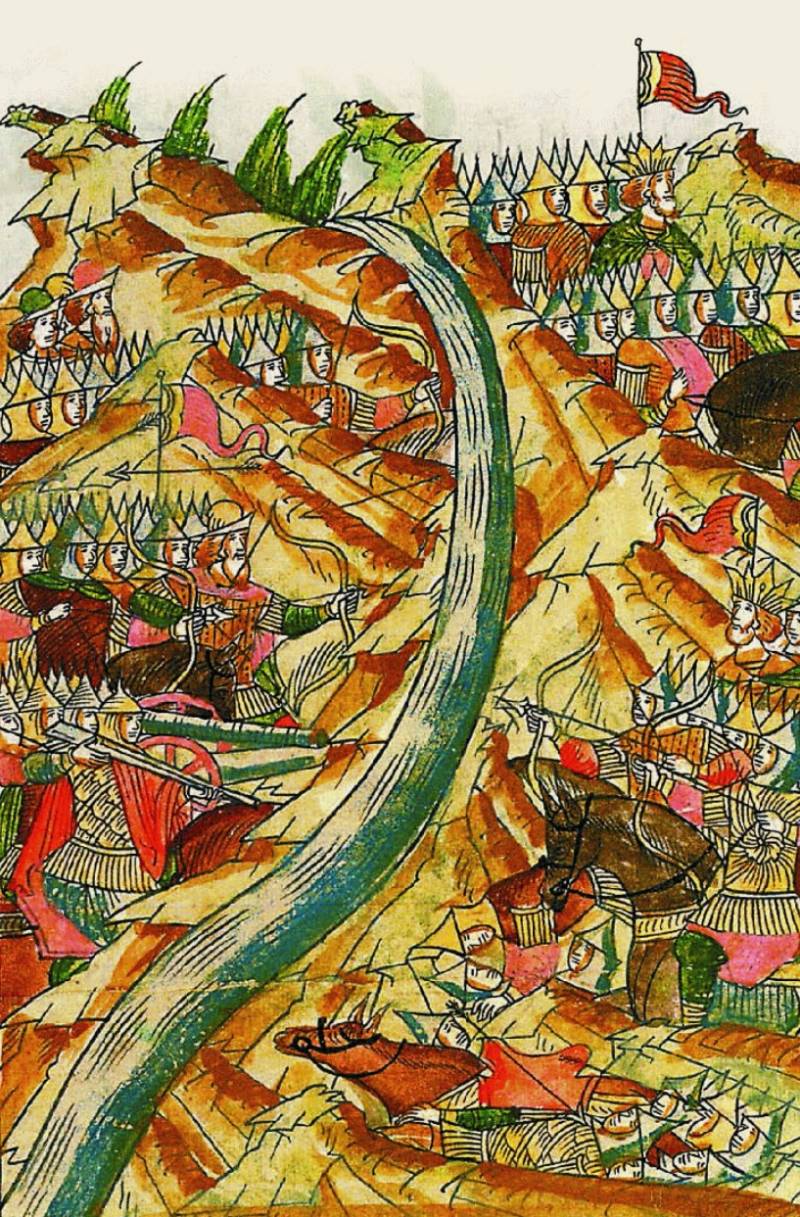
Daniil Kholmsky was the actual commander of the Russian regiments during the famous standing on the Ugra River in 1480. Miniature "Standing on the Ugra". Front chronicle, XVI century
Kazan triumph
Historians believe that Prince Kholmsky achieved his military triumph in 1487 during a campaign against Kazan. The Kazan Khan violated the agreements of 1469 many times, making frequent raids on the Russian border lands. Ivan III, seeking to put an end to the raids of his aggressive neighbor, intended to put his protege, Khan Mohammed-Emin, on the Kazan throne. In April 1487, a large army went to Kazan, the main figure in which was Daniil Kholmsky.
At the mouth of the Sviyaga River, the Moscow regiments met with the Kazan regiments of Khan Ilham. With a swift flank attack, Kholmsky defeated the Khan's army, forcing him to flee to Kazan. On May 18, Russian regiments besieged the Kazan fortress. The Tatars shut themselves up in the city and began to counterattack the Russians, making numerous sorties.
Kholmsky blockaded Kazan with the help of a "jail", skillfully fought off Kazan attacks and waited for help from Moscow. Ivan III sent to him the cavalry of Prince Vasily Shuisky and the ship's army of Prince Ivan Romodanovsky. With them, Kholmsky took Kazan into a strong ring. From the rear, the Russian regiments were constantly disturbed by the equestrian detachment of Prince Aligazy. In his resolute manner, Kholmsky also defeated this detachment, and on July 9 the Kazan capitulated.
Kholmsky carried out the entire operation in a record seven weeks. This was the first time in history when the Moscow army conquered Kazan. Khan and his relatives were sent to Russia. Muhammad-Emin became Khan of Kazan, and Moscow governor Dmitry Shein was sent to Kazan to control the policy of the Khan.
The campaign of Prince Kholmsky became a turning point in Russian-Kazan relations. For several decades, the aggressive Kazan Khanate, having become a state semi-dependent on Moscow, entered the mainstream of Russian politics. It was precisely the fact that Kazan became the patrimony of the Russian princes in 1487 that Ivan the Terrible substantiated in the future for all subsequent claims to the Kazan Khanate, who in 1552 finally annexed it to the Muscovite state.
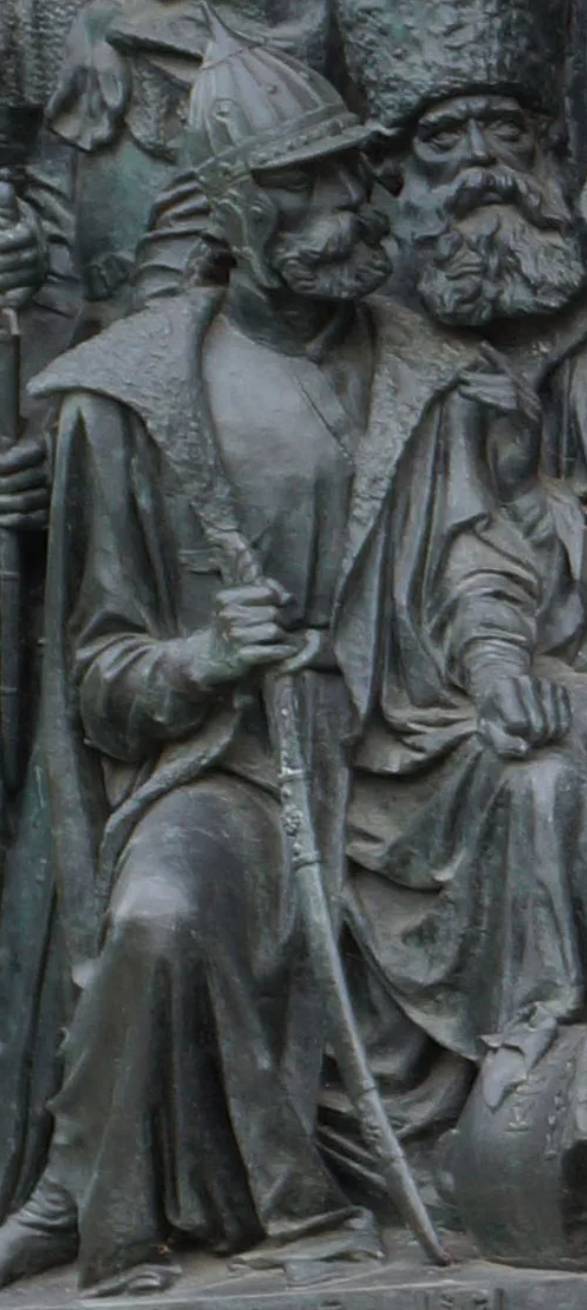
Sculptural image of Daniil Kholmsky on the frieze (lower tier) of the monument to the Millennium of Russia M. O. Mikeshin, I. N. Shreder
The heirs and legacy of Prince Kholmsky
The last military campaign of Prince Kholmsky was a military campaign in the southeastern lands of the Grand Duchy of Lithuania. In 1492, his regiments captured and ravaged the cities of Mtsensk and Lubutsk.
Already at an advanced age, Prince Kholmsky won another victory in his career. He will die in 1493, having won the glory of an invincible commander during his lifetime.
The prince was married to the daughter of I. I. Zabolotsky, the grandson of the famous Moscow boyar Ivan Vsevolozhsky, who was blinded by order of Grand Duke Vasily II in 1433. Sources report that Kholmsky had 2 sons and 3 daughters. His daughters will become the wives of famous military leaders and major aristocrats of that time.
The sons of Prince Semyon and Vasily will also become governors in the grand ducal service. The younger Vasily will grow into a "major political figure." Ivan III will give him the rank of boyar, marry his daughter Theodosia, in fact make him the eldest of the boyars, a kind of "deputy" of the sovereign. In 1508, already under Vasily III, he will lead a large army, where the most famous military leaders of that time will be appointed as governors subordinate to him. Together with them, he will kick the Lithuanians out of Dorogobuzh. However, immediately after the end of the military campaign, Vasily Dmitrievich would become a victim of court struggle and end his life in a monastery prison.
Daniil Kholmsky was the military leader who knew how to act quickly, without the orders of the Grand Duke. Anticipating Alexander Vasilyevich Suvorov, he defeated the enemy "not by numbers, but by skill." Like Suvorov, Kholmsky relied on a decisive flank or frontal attack, which made it possible to overturn enemy regiments. Largely thanks to this tactic, Prince Kholmsky won absolutely all the battles in which he participated. And this despite the fact that in most battles he had to deal with a numerically superior enemy.
- Kholmsky as early as the XNUMXth century embodied the axiom of successful warfare, formulated by the great Suvorov in the second half of the XNUMXth century.
In our time, the name of Daniil Dmitrievich remains largely forgotten. Many military leaders of the XNUMXth-XNUMXth centuries pushed aside the outstanding commander of the fifteenth century, who did not suffer a single defeat. Such is the paradox of our history - so rich in outstanding personalities that many of them are still in oblivion ...
Bibliography:
Kornilov D. F. The invincible governor // Russian History: No. 10, 2022. p. 30–31.
Borisov N. S. Russian commanders of the XIII-XVI centuries - M.: Enlightenment, 1993.
Volodikhin D. M. Generals of the Moscow Kingdom: Young Guard, 2020.
Information